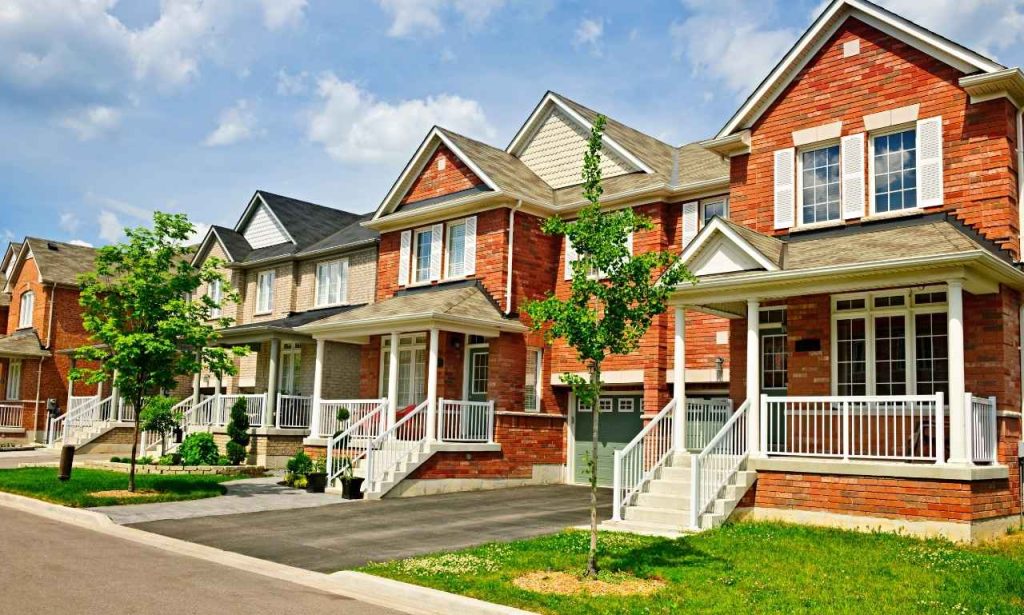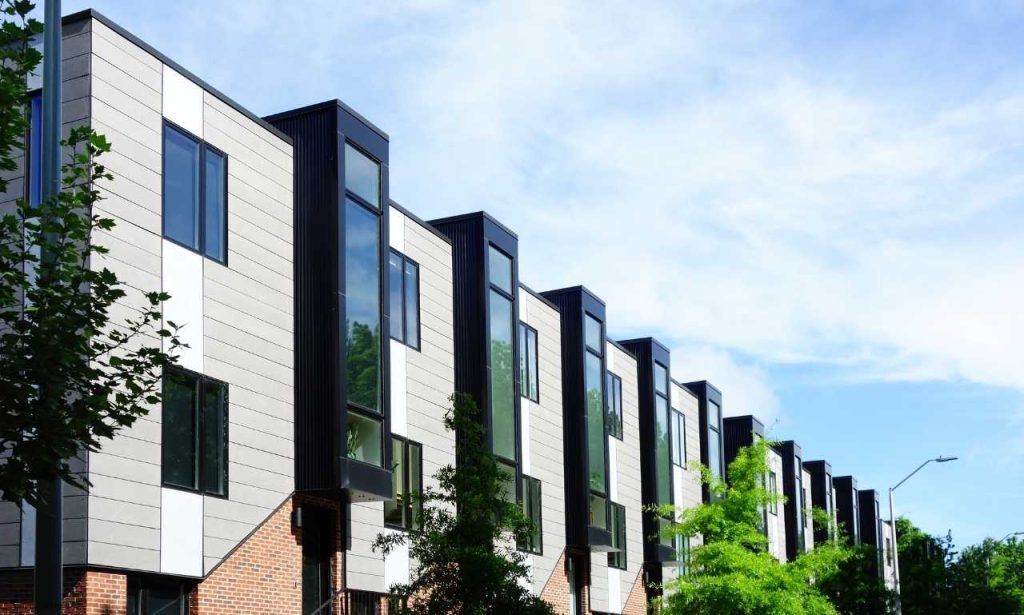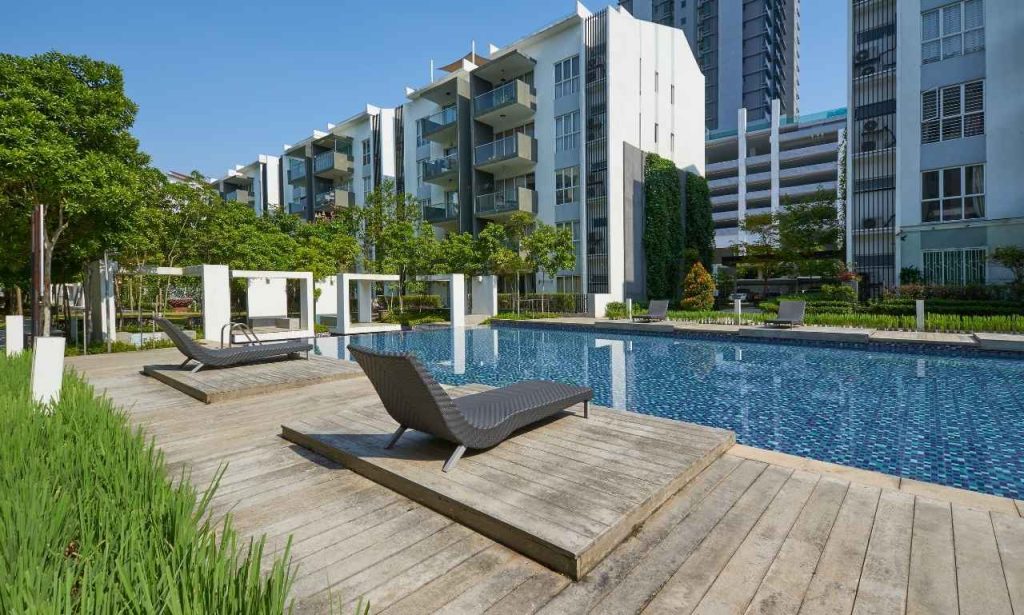You’ve probably driven past those neat rows of matching homes and wondered what life’s like inside. Townhouses hit a sweet spot for many buyers, especially those dipping their toes into homeownership for the first time. Not quite a condo or detached home, townhouses offer something unique in between. Let’s reduce the noise and determine if townhouse living might be the right choice for you.
What is a Townhouse?

Picture this: multi-story homes sharing walls with neighbors on one or both sides, like books on a shelf. That’s a townhouse in a nutshell.
Unlike apartment buildings, each townhouse has its own entrance, and you navigate hallways to reach your door. Most include private outdoor space—maybe a small yard or patio where you can grill or plant flowers. The architecture creates a unified look across the community, though interior layouts vary widely.
Townhouses date back centuries to crowded European cities where land was scarce. Early American versions popped up in Boston, New York, and Philadelphia, where you can still find historic brownstones commanding eye-watering prices.
What’s the ownership structure like? Unlike condos, you typically own your unit’s interior and exterior plus a small plot of land. This ownership arrangement brings more responsibility and control than condo living.
Structural Differences
“But how’s it different from other homes?” I constantly hear this question from my clients.
Shared walls mark the most obvious distinction from detached single-family homes. Your neighbor’s living room might share a wall with yours, though modern construction usually incorporates decent soundproofing.
Unlike most condos, townhouses typically have multiple floors. The kitchen and living areas might be on the main floor, with bedrooms upstairs and perhaps a finished basement below. This vertical living creates a natural separation between spaces.
The footprint stays relatively compact compared to detached homes, which explains the more affordable price point. Square footage varies tremendously, from cozy 1,200 square-foot units to sprawling luxury townhomes exceeding 3,000 square feet.
Construction materials and quality fluctuate wildly between communities. Those fancy new townhomes downtown probably boast energy-efficient windows and premium insulation, while that 1970s development might need some updates.
Pros of Owning a Townhouse
Less Maintenance
Remember last winter when Jake spent every weekend shoveling snow while I binged Netflix? His detached home demanded constant attention, while my townhouse HOA handled all that exterior maintenance.
That’s the magic of townhouse living! The association typically manages landscaping in common areas, saving you from mowing, weeding, and seasonal cleanups. Many handle exterior painting, roof repairs, and even gutter cleaning—jobs that drain time and money from detached homeowners.
For busy professionals, this arrangement feels like striking gold. Coming home from long work days without facing weekend chores is priceless. Traveling without worrying about maintenance is even better.
My retired clients particularly value this aspect. As mobility decreases, exterior home maintenance becomes increasingly challenging. Townhouse living removes that burden entirely.
The flip side? Those maintenance services aren’t free but are funded through your HOA fees. Still, spreading costs across multiple homeowners often proves more economical than handling everything yourself.
Amenities Included

Walking five steps to a resort-style pool beats maintaining your own any day! Community amenities represent another major townhouse perk.
Many developments offer swimming pools, fitness centers, clubhouses, and playgrounds that would cost a fortune individually. Some upscale communities include tennis courts, dog parks, walking trails, and even concierge services.
During my tour of a luxury townhouse community last year, I was blown away by its clubhouse—complete with a professional kitchen, theater room, and co-working spaces. One resident mentioned hosting her daughter’s wedding reception there without additional venue fees!
These shared resources create organic opportunities for community building. Monthly socials, holiday events, and summer BBQs foster connections between neighbors that rarely develop in more isolated housing situations.
Added Security
Are safety concerns keeping you up at night? Townhouse communities often provide enhanced security features.
Proximity to neighbors creates natural surveillance—more eyes watching means fewer opportunities for mischief. Neighbors notice unfamiliar faces or unusual activities, creating an informal neighborhood watch.
Many developments add controlled access points, security patrols, or camera systems monitoring common areas—some feature gated entrances requiring key cards or codes for entry.
The shared wall structure offers security advantages—fewer exterior walls mean fewer potential entry points for intruders. Crime statistics consistently show lower break-in rates in townhouse communities versus detached homes.
These security benefits provide substantial peace of mind for single dwellers, young families, or frequent travelers.
More Living Space Than Condos
Clients often tell me they considered condos but craved more space. Townhouses deliver precisely that middle ground.
The multi-level design typically offers more square footage than comparably priced condos. That vertical arrangement creates distinct zones for living, entertaining, and sleeping—perfect for families or those working from home.
Most townhouses include attached garages, eliminating weather-exposed walks from parking areas. Private outdoor spaces, though modest compared to detached homes, still allow for container gardens, small pets, or morning coffee outdoors.
A finished or unfinished basement provides valuable bonus space for storage, home gyms, or hobby areas. These flexible spaces adapt to your changing needs over time.
Cons of Owning a Townhouse
Lack of Privacy
Let’s not sugarcoat it—shared walls mean occasionally hearing your neighbors’ lives. How much depends entirely on construction quality and neighbor habits.
Bass-heavy movie soundtracks might vibrate through walls in older units. Footsteps from above can become annoying in poorly insulated multi-story developments. Early-morning lawn maintenance in common areas might disturb weekend sleep-ins.
Outdoor privacy limitations exist, too. Your patio might be in clear view of several neighbors, and backyard conversations could carry to adjacent homes. Window placement sometimes creates awkward sight lines between units.
End units (those sharing just one wall) command premium prices precisely because they offer greater privacy. If solitude ranks high on your priority list, budget or consider different housing types.
Limited Customization Options
“You want to paint your front door purple? Good luck with that HOA approval!”
Homeowners associations typically regulate exterior appearances strictly. Paint colors, landscaping choices, window treatments, and structural modifications require approval to maintain community aesthetics.
These restrictions protect property values but frustrate individualistic homeowners. Your dream of dramatic exterior renovations might clash with association rules that maintain visual cohesion.
Even interior modifications face limitations if they affect shared structural elements. Removing walls, rerouting plumbing, or making electrical updates might require engineering approvals beyond regular permits.
These limitations can feel stifling for those who view their home as a canvas for personal expression. Creative types often chafe under such restrictions after the initial honeymoon period fades.
What Do I Need to Know Before Buying a Townhouse?
Decide How Much You Can Afford
Financial readiness should drive your housing decisions, not emotional attachments to granite countertops or community pools.
Start by calculating your budget, factoring in mortgage payments, property taxes, insurance, and homeowners’ association fees. Lenders typically recommend housing costs below 28% of your gross monthly income.
Don’t forget about HOA fee increases! These rise regularly, sometimes dramatically,y if major repairs loom. Request historical data on fee adjustments before committing.
Consider your down payment options carefully. While a 20% down payment avoids private mortgage insurance, many first-time buyers successfully leverage low-down-payment programs. Each approach carries distinct advantages and challenges.
Remember to budget for closing costs—typically 2-5% of the purchase price—and maintain an emergency fund for unexpected repairs not covered by association maintenance.
Choose The Right Location
“Location, location, location” became a real estate cliché for good reason—it matters enormously!
Evaluate commute times during actual rush hours, not just distance measurements. Consider proximity to frequent destinations like workplaces, schools, grocery stores, and healthcare facilities.
Research neighborhood safety statistics and trends. Visit prospective areas during the day, evening, and weekend to observe traffic patterns and activity levels.
Future development plans can dramatically impact property values and quality of life. Check with local planning departments about upcoming projects that might affect the area.
School district quality influences resale values significantly, even for buyers without children. Strong districts typically correlate with more stable property appreciation over time.
Learn About The Homeowners Association
The homeowners’ association will impact your townhouse experience daily. Do your homework here!
Review financial statements closely. A well-funded reserve account indicates preparation for future major expenses without special assessments. Request documentation of recent rate increases to gauge future trends.
Read the Covenants, Conditions, and Restrictions (CC&Rs) thoroughly. These governing documents detail everything from pet policies to holiday decoration guidelines. Minor rules can significantly affect lifestyle satisfaction.
If possible, attend a board meeting before purchasing. Observe how disputes are handled and decisions are made. Talk with current residents about their experiences with association management.
Understand the architectural review process for any modifications you might want. Some associations approve changes quickly; others operate like mini-bureaucracies.
Weigh The Pros And Cons Of A Townhouse

Finally, assess how townhouse characteristics align with your specific lifestyle and preferences.
If outdoor maintenance tasks drain your joy, shared maintenance responsibilities offer tremendous value. If you cherish absolute quiet, construction quality becomes paramount in your search.
Consider your plans realistically. Growing families sometimes outgrow townhouses, while aging residents might appreciate single-level living eventually. How long do you expect this home to meet your needs?
Evaluate whether community amenities justify their cost for YOUR lifestyle. That gorgeous pool adds value only if you use it regularly.
Think about your social preferences honestly. Close-knit communities foster connections but require tolerance for neighbor proximity. If you prefer isolation, townhouse living might feel constraining.
Conclusion
Townhouses occupy that sweet middle ground on the housing spectrum—they are more affordable than many detached homes while offering more space and privacy than typical condos.
Townhouses present compelling advantages for first-time buyers, downsizers, or those prioritizing location over square footage. The reduced maintenance, community amenities, enhanced security, and efficient use of space appeal to diverse buyers.
However, shared walls, customization limitations, and association regulations create legitimate drawbacks for some lifestyles. Your particular priorities should guide this significant decision.
Whatever housing type you choose, remember that “perfect” homes rarely exist—but finding the right fit for your specific needs certainly does. Take time to investigate potential communities thoroughly before making commitments.
The right townhouse can balance affordability and comfort, community and independence, convenience and ownership pride.
Also Read: How to Sell Your House Fast – and for More Money
FAQs
Townhouse HOA fees typically range from $150 to $ 500 monthly, depending on the amenities and services included.
Many associations allow rentals, but restrictions vary widely—check the CC&Rs before purchasing.
Historically, detached homes appreciate slightly faster, but location quality impacts appreciation more than housing type.
Modern townhomes feature fire-rated walls with sound insulation, but older units may have thinner separations.
HOAs typically provide mediation processes for resolving conflicts between townhouse owners.



